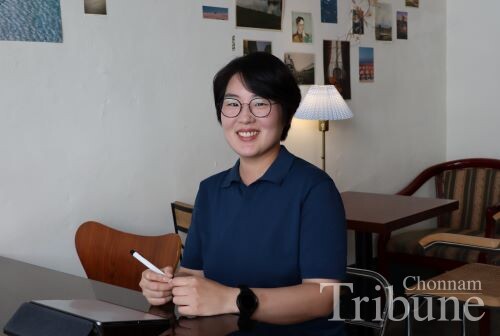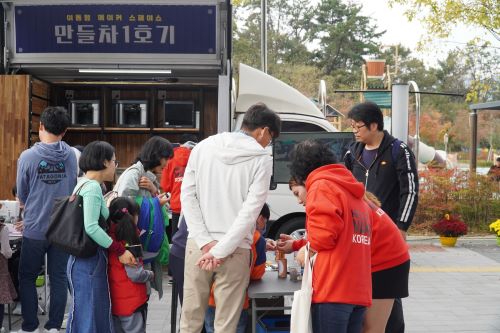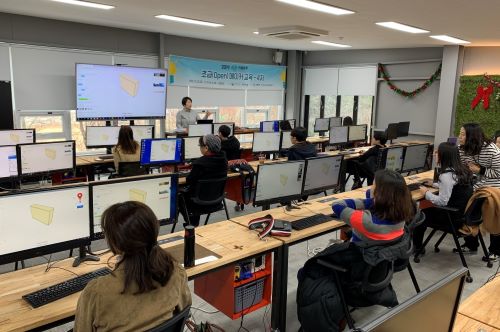(주)만들닷 대표 심은지

Creativity coming from imagination is a unique human ability. It needs to be created to turn imagined things into a tangible reality. There is someone who plays a role in facilitating this creative process by running a business through innovative maker activities. Sim Eun-ji, who is a 2014 graduate alumna of the Faculty of Business Administration at Chonnam National University (CNU), has been helping people achieve their dreams through a company called "Makedot". The Chonnam Tribune met with CEO Sim to hear the story of promoting a maker culture across the country through the company.
The Path to Makedot
Recently, there has been a trend of increased small-scale personal manufacturing startups due to the ease of creating prototypes and starting businesses. This can be explained as part of the rise of a maker culture, which aims to turn the desire to make something into reality based on simplified production techniques. The government also supports further vitalizing the culture. In this flow, Makedot takes the lead in the non-governmental sector by assisting easy access to the infrastructure required for fostering creative endeavors. How did such a company come into being? We wanted to know about the story of launching her company.
The CEO of Makedot said, “While studying Business Administration at the university, I participated in entrepreneurial club activities in my senior year. That experience led me to consider launching a start-up. After graduation, I found the planning and operation of startup-related education run by the Startup Incubation Center of CNU fascinating. Thanks to this kind of experience, I started focusing on the process of creation as well as preparing for entrepreneurship.”
Of course, there have been challenges. Seeking and creating work alone remains a chronic issue. Furthermore, when collaborating with others, if everyone’s opinion aligns, you can proceed as planned, but when they do not, it requires revisions and finding common ground. Sim's words reflect a significant responsibility. “I am striving in every step of the process.”

Being a Supporter
Makedot’s business can be divided into three categories: education, kit and content development, and prototyping. “We play a supporting role behind the scenes in the market, so the impact we have on and receive from people we meet is more significant than the results.” said Sim. As education directly influences people, it can change someone's perspective about the future or make their work more convenient by learning techniques. Education simply being enjoyable also has a meaningful impact on students.
However, space and equipment are necessary for education. That is why establishing makerspaces that provide these resources has been crucial in the domestic maker culture. A makerspace called “Mandeul-maru” at CNU is one example. There were several programs organized by the space and operated by Makedot. Nowadays, the spaces go beyond the simple concept of a place for creation; they function as platforms for communication and play a pivotal role in fostering communities.
When it comes to visiting places, where equipment might be lacking, Makedot sends its mobile makerspace, called “Mandeul-cha” (maker car). It is a mobile vehicle, designed and created by Makedot themselves. Sim mentioned it is similar to a food truck. Just like a truck carrying ingredients and cooking tools, the mobile makerspace contains the necessary infrastructure for creative production.
Making the Ordinary Extraordinary
On the path toward one’s goals, a strong motivation takes place. Then, what is the way Makedot is heading to? "I started with the goal of doing something fun, and even now, I find this work fulfilling. I will continue to pursue engaging projects with my team," she said. Currently, the company is in the process of conceptualizing and developing its products. This is a new challenge that keeps her engaged in her work.
In the era of highly advanced technology, the need for individuals with unique creativity is crucial. Paradoxically, it is rare to find true originality these days. CEO Sim’s work seemed to involve a lot of creativity. When asked for some advice on thinking creatively, she mentioned, "It is important to consider how to approach familiar things differently. In addition, instead of solely focusing on fields of interest, exploring content from various areas is beneficial. Lastly, writing notes can capture passing ideas that might come in useful in the future.”

"No Useless Experience”
During the time Sim took two years off from university, she was on a working holiday in Australia. Through her work, she gained firsthand experience of the industry's systems. Also, she learned one more thing, “There truly is no such thing as a useless experience.” One day, Sim temporarily took over the cashier's duties at her work. "I had experience working in a convenience store before, so I was able to do it. Later on, I also took on cashier duties and even got promoted to a managerial role. That was when I learned how to take initiative in my tasks," she explained. Sometimes, experiencing a variety of things does not only bring immediate benefits; even a decade later, those experiences can be proven valuable.
Lastly, there is a message from Sim to her juniors: “There are experiences that you can only have in your student days. Keep an eye on the university programs and challenge yourself in various fields, regardless of your interest. Please remember, it is okay to be inexperienced right now.”

